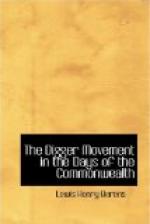The statement that toleration was the one leading principle of Cromwell’s life, may seem somewhat exaggerated to those who have not carefully studied his career. By his own words let him be judged. Writing to Major Crawford as early as March 1643 (1644) he plainly tells him—“Sir, the State, in choosing men to serve it, takes no notice of their opinions; if they be willing faithfully to serve it, that satisfies.” After Naseby, under date June 14th, 1645, in his dispatch to the Speaker, he tells the Presbyterian House of Commons—“Honest men served you faithfully in this action. Sir, they are trusty; I beseech you in the name of God not to discourage them.... He that ventures his life for the liberty of the country, I wish he trust God for the liberty of his conscience, and you for the liberty he fights for.” The meaning of these words was not lost to the House, so when sending his dispatch to the press, they carefully omitted this paragraph.
After the siege of Bristol, Cromwell is still more outspoken. Under date September 14th, 1645, he writes to the Speaker as follows—“Presbyterians, Independents, all have here the same spirit of faith and prayer; the same presence and answer; they agree here, have no names of difference; pity it should be otherwise anywhere—for, bretheren, in things of the mind we look for no compulsion but that of light and reason.” This dispatch, too, the House of Commons took care to mutilate before sending it to the press.
As he advanced in his career, Cromwell became still more outspoken. In his opening speech to his first Parliament, after having given expression to his view that the Lord had given them the victory for the common good of all, “for the good of the whole flock,” he continues—“Therefore I beseech you—but I think I need not—have a care of the whole flock! Love the sheep, love the lambs; love all, tender all, cherish and countenance all, in all things that are good. And if the poorest Christian, the most mistaken Christian, shall desire to live peaceably and quietly under you—I say, if any shall desire but to lead a life of godliness and honesty, let him be protected.”
Again, when dissolving his first Parliament (Speech IV.), he expresses the same thought in the following words—“Is there not yet upon the spirits of men a strange itch? Nothing will satisfy them unless they can press their finger upon their bretheren’s consciences, to pinch them there. To do this was no part of the contest we had with the common adversary. For religion was not the thing at first contended for, but God brought it to that issue at last; and gave it unto us by way of redundancy; and at last it proved to be that which was most dear to us. And wherein consisted this more than in obtaining that liberty from the tyranny of the Bishops to all species of Protestants to worship God according to their own light and consciences? ... And was it fit for them to sit heavy upon others? Is it ingenuous to ask liberty and not to give it? What greater hypocrisy than for those who were oppressed by the Bishops to become the greatest oppressors themselves, so soon as their yoke was removed? I could wish that they who call for liberty now also had not too much of that spirit, if the power were in their hands.”




